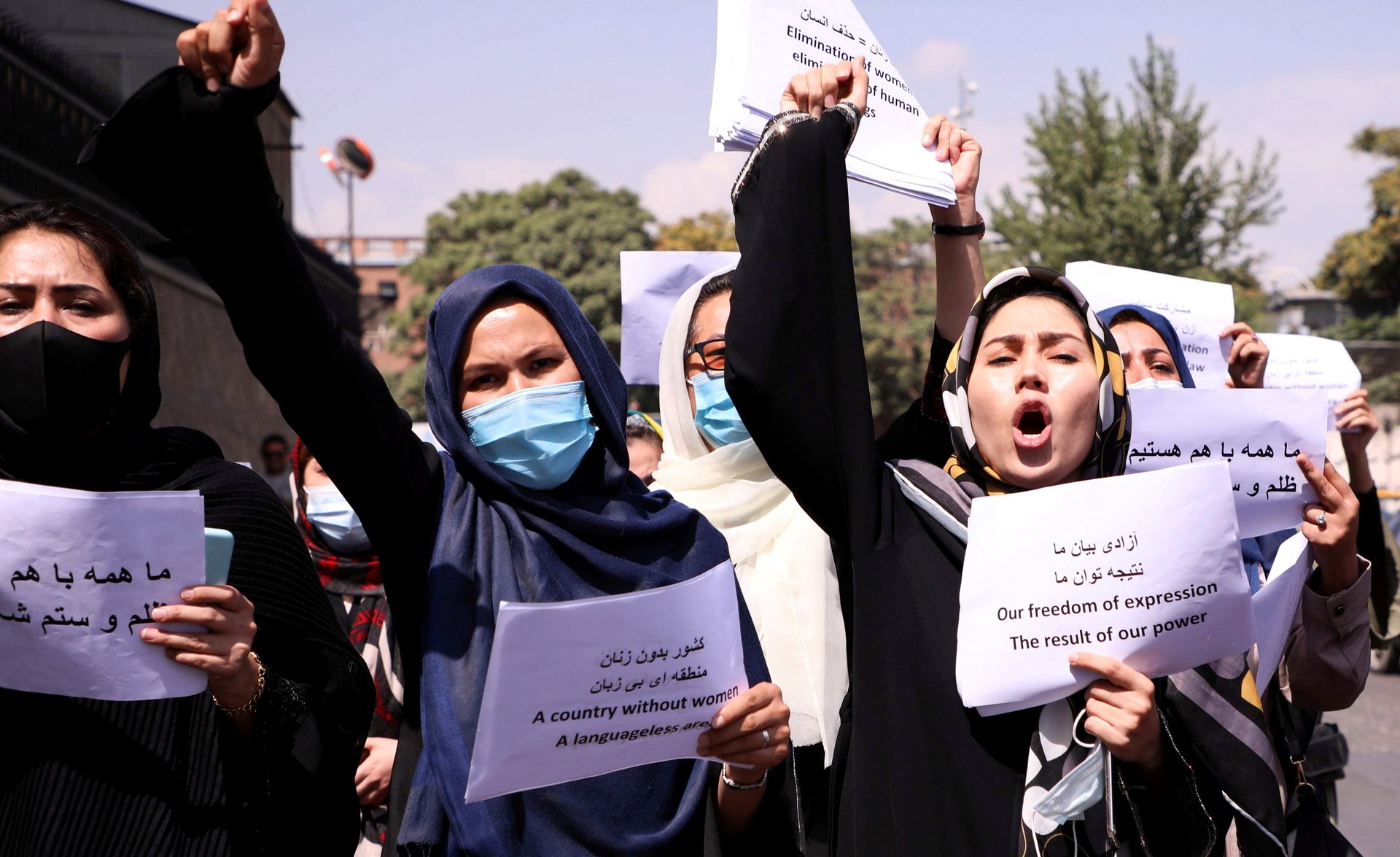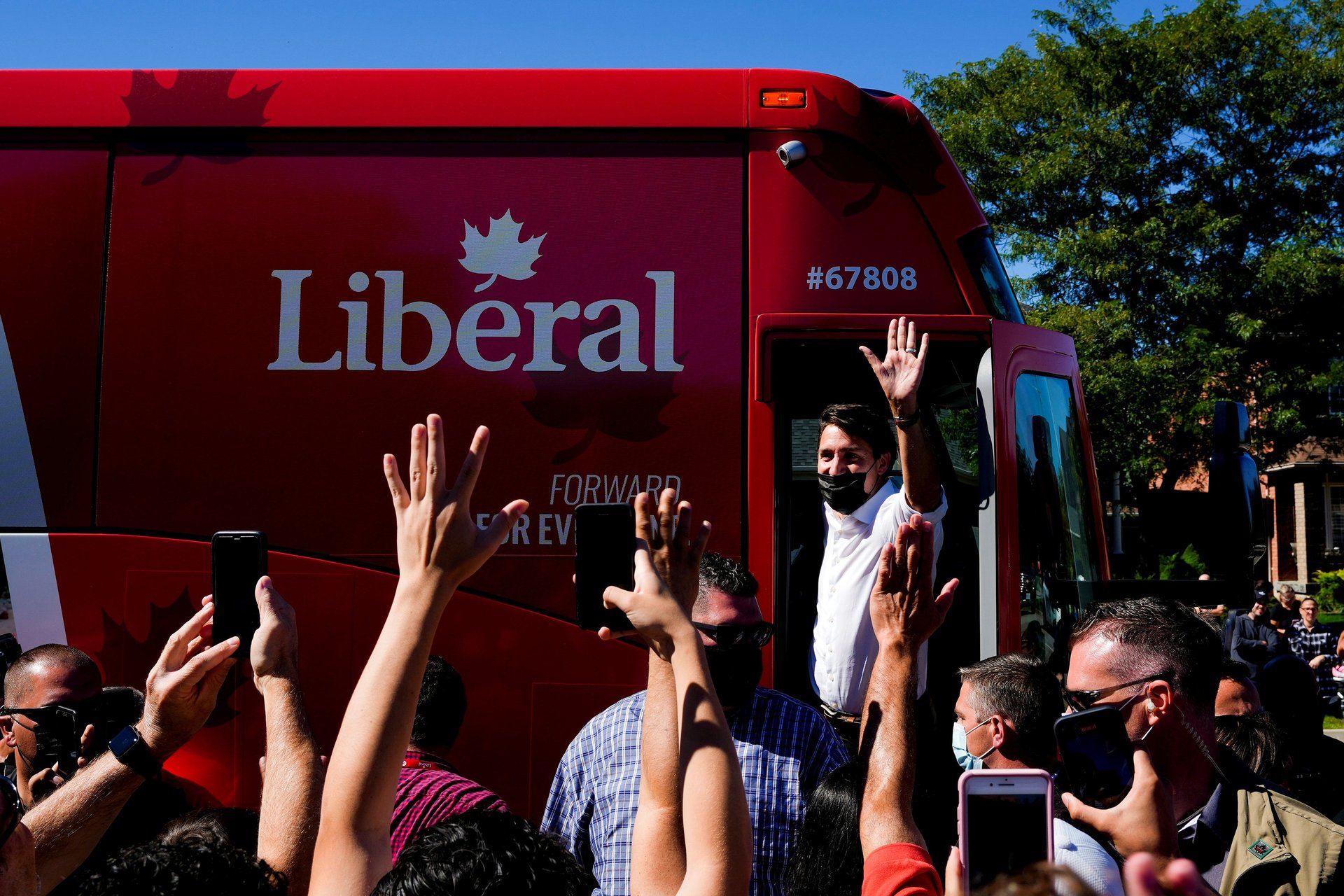Female government workers in Kabul told to stay home
Good morning, Quartz readers!


Good morning, Quartz readers!
Was this newsletter forwarded to you? Sign up here. Forward to the friend who is planning on book shopping for the holidays.
Here’s what you need to know
Women workers in Afghanistan were told to stay home. Female government workers in Kabul shouldn’t work unless there are no men are available to do their jobs, the city’s new Taliban mayor said.
Australia’s prime minister defended the submarine deal that enraged France. The nation’s national interest “must come first and did come first,” Scott Morrison stated.
Hong Kong held a “patriots-only” election. Under new rules set by Beijing, only 8,000 approved voters could cast ballots, 97% fewer than in 2016’s election
China defends its crackdown on tech firms. In a meeting with Wall Street executives, regulators tried to assure bankers the country wasn’t stifling innovation.
A volcano erupts in the Canary Islands. Four villages on La Palma were evacuated.
Paris held a car-free day. Thousands of pedestrians thronged the Champs-Elysees during the annual event.
What to watch for
“Now?!” was the general response from Justin Trudeau’s critics and supporters alike when the Canadian prime minister called a snap election six weeks ago.
Trudeau claimed he was offering Canadians a say in navigating the pandemic, but his early election call was widely seen as a poorly timed, ego-driven, costly power grab—an attempt to secure a majority of parliamentary seats.
The vote is set for today. Although Trudeau was once polling ahead of his main opponent, Erin O’Toole, who heads the Conservative party, the challenger has essentially closed the gap, largely by turning the election into a referendum about the incumbent’s performance. Covid-19 measures, healthcare worker shortages, and the high cost of living have led the public conversation. Unlike the Liberals, O’Toole’s party doesn’t believe in vaccination mandates for federal workers and passengers traveling domestically on planes and trains.
Polls show that Trudeau appears likely to squeak out another minority government. His PR team is no doubt prepping responses to the obvious question: Was it worth it?

Coming to a TV near you
Now that the Food and Drug Administration has approved Pfizer’s Covid-19 vaccine, the drug giant is planning a massive marketing campaign. It may seem counterintuitive—perhaps no drug has gotten more free publicity than Covid vaccines—but Pfizer sees huge potential for booster shots. If boosters become annual events, like flu shots, Pfizer wants to ensure it’s the one selling them.
What will the campaign look like? Pfizer isn’t telling, but there are two basic forms of pharma advertising:
🩺 Help-seeking: These ads aim to expand awareness of a disease or, in this case, of the availability of a vaccine and its value. They focus on expanding the market, and let consumers know that they should be talking to their doctors—but cannot specifically mention a drug by name.
💉 Product claim: This kind of ad promotes the prescription drug with its brand name. A product claim ad can also be comparative, selling a product by highlighting the way in which it is superior to a competitor. Critically, though, it has to list side effects and risks as clearly as its benefits, which could be an issue for Covid vaccines.
How to read 100 books in a year
Most of us would like to be better read. But that means reading more books, and few of us feel we have the time or patience required to be diligent readers. Quartz email editor Susan Howson isn’t afraid to set lofty goals, however, and she offers these tips for becoming a power reader:
📱 Log off from social media. Doomscrolling and FOMO take a toll on your mental and physical health, while sucking up time you could be spending doing something good for yourself. The year Susan decided to delete her Instagram account, she read 29 more books.
📖 Be format agnostic. Susan isn’t a book snob, and juggles audio, e-books, and paper books. “I have a three-book system going at all times: One paper book to read at night, one audiobook for listening to while I cook dinner or take walks, and one ebook for when it’s just me and my phone.”
Quartz’s How To emails don’t count as books, but reading them will make you smarter. ✦ Don’t miss future editions—become a member now, and take 40% off with code QZEMAIL40.
What we’re reading
🚆 France is rolling out a new high-speed train. Why is the US so far behind on advanced rail travel?
🛢️ Los Angeles County officials voted to phase out oil and gas drilling there. Before Hollywood, fossil fuels were LA’s original claim to fame.
🤑 Amazon is raising its average hourly US wage to $18 an hour for warehouse workers. Other employers could be forced to follow suit.
🗑️ Bitcoin mining creates a mountain of electronic waste. For every two bitcoin transactions, miners discard the equivalent of an iPad in obsolete computer hardware.
🚢 Ports are a mess but shipping company profits are at record highs. Companies desperate to capture surging consumer demand are willing to pay exorbitant freight prices.
Surprising discoveries
A French acrobat traversed the Seine on a 2,000-foot slackline. The line was strung 230 feet above the river, between the Eiffel Tower and the Chaillot Theater.
One of the world’s last surviving herds of undomesticated cattle roam the property of a British castle. They share a gene pool so small that the animals are almost identical to one another.
The narrowest house in Boston sold for more than $1.2 million. According to local lore, it was built in the 1860s by a man expressly to block the sunshine coming into his loathed brother’s house next door.
Cup Noodle is celebrating their 50th anniversary. Japan’s Nissin Foods, which produces this staple of college dorms and office lunchrooms, rolled out four varieties of ramen-inspired carbonated soda for the occasion.
Researchers designed a room with walls that emit an electrical field. Phones, medical implants, and other devices can charge wirelessly inside—and it’s safe for people to be in there too.
Bronze Age nomads in eastern Europe relied on milk to fuel their migration out of Russia. German researchers identified milk proteins in fossilized plaque on teeth from skeletons.
Our best wishes for a productive day. Send any news, comments, rare cattle, and skinny houses to [email protected]. Get the most out of Quartz by downloading our iOS app and becoming a member. Today’s Daily Brief was brought to you by Tim McDonnell, Lila MacLellan, Annalisa Merelli, and Oliver Staley.